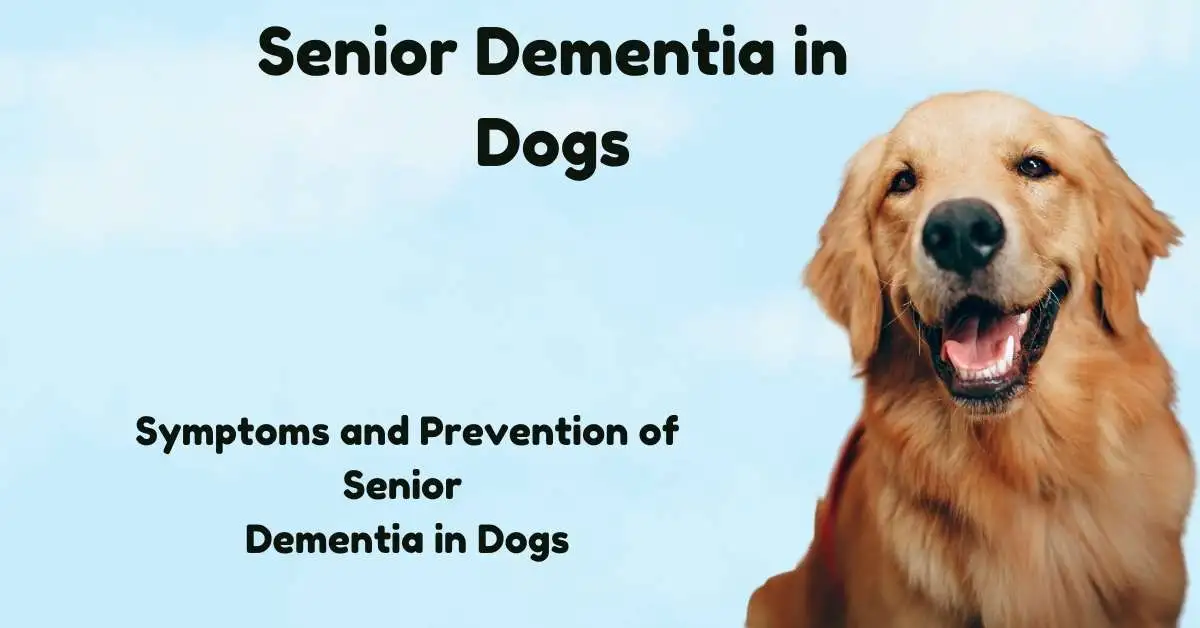Senior Dementia in Dogs: Causes, Symptoms, and Treatments
Today we discuss the disease called senior dementia in dogs. We all know that dogs are loyal animals, if you like your dog and care for it, then you would want your dog to live a healthy and lengthy life, but as a dog grows old it will deal with various problems, for instance a dog that sleeps for too long. Not surprisingly, older dogs may have more serious or difficult problems such as kidney disease or hearing issues.
However, physical weakness is not just a problem for senior dogs. It can rarely be found in normally healthy dogs. It’s your dog What Happens to Mental Abilities Should a Dog Suffer from Senior Dementia in Dogs Fortunately, canine dementia affects many older dogs and is the dog equivalent of human Alzheimer’s disease. These diseases affect a dog’s memory, behavior, sleep patterns, activity, and appetite.
What Is Senior Dementia in Dogs?
Dog dementia, also known as canine cognitive dysfunction,, is a condition in which your dog’s behavior and mind changes, such as learning, remembering, and understanding its environment. A function is not technically a good term, but it is more accurate to call this condition in dogs Cognitive Dysfunction Syndrome (CDS) because we do not know that other animals in the canine family suffer from this disease. That is, like lupus, many other diseases can cause symptoms that are similar to CDS.
For example:
Joint pain in dogs that makes them less likely to dig and play can also be a sign of this disease. Diagnosing Senior Dementia in Dogs is therefore a process in which all other possible medical causes must first be ruled out before the diagnosis is made. I have found that Only one dog at 11 to 12 years of age had Dementia, and the same number of dogs 10 to 12 at 15 or older, or 68 percent, had it.
What is the Cause of Senior Dementia in Dogs?
Senior Dementia in Dogs is a disease that is usually caused by changes in the brain that are associated with aging. In some such changes, CDS affects a brain’s neurons, which are the cells that carry information in the brain. If these neurons do not function properly, the brain cannot function properly. The most common cause of CDS is similar to Alzheimer’s disease in humans. It results from oxidative damage to brain cells.
However, caused by poor blood circulation and too little oxygen, and partly by impaired oxygen metabolism in the brain cells, these are changes that produce toxic proteins that contribute to the overall death rate of neurons. It increases a lot, especially in the areas where memories are stored, these areas are called the hippocampus, which is the part of the brain that stores memory and remembers your memories forever.
What Senior Dementia in Dogs Symptoms Should You Watch For?
Senior Dementia in Dogs affects older dogs and symptoms begin around nine years of age, but gradually progress, with only one or two symptoms appearing at first, but then becoming completely severe. Some of the most common symptoms known as DISHA include the following behaviors:
Interaction:
A dog with dementia will have very limited interactions with people and other pets. It will not be as independent as before but will start living with you, he will not be as friendly as before but will become isolated.
Sleep-Wake Cycle:
A dog with dementia will have altered sleep patterns, with dogs sleeping more during the day being lethargic, and waking more at night.
House Soiling:
Senior Dementia in Dogs can have a profound effect on your dog’s memory, causing your dog to urinate or defecate in the house. This is an important problem to forget. These owners often ignore when their pet occasionally forgets to eat, but they always notice when the dog messes up in their house even though they are not allowed to go outside.
Medication of Senior Dementia in Dogs:
Senior Dementia in Dogs usually comes with treatments to slow the progression of the disease and manage symptoms. A commonly prescribed medication is Selegiline, which raises dopamine levels in the brain to improve cognitive function and perhaps even slow cognitive decline. Often used in conjunction with Selegiline are antioxidants and supplements as aids for brain health. Melatonin may be prescribed for dogs that ‘sleep disturb’, to affect sleep patterns and decrease restlessness. Along with other treatments, such as diet changes or environmental changes, these medications can help manage symptoms of dog dementia and greatly improve the dog’s quality of life.
Behavioral Improvement:
Puzzles, new toys, and regular play keep your dog mentally active. A consistent daily routine reduces dog confusion and anxiety. Mental capacity can be maintained with simple commands and positive reinforcement.







